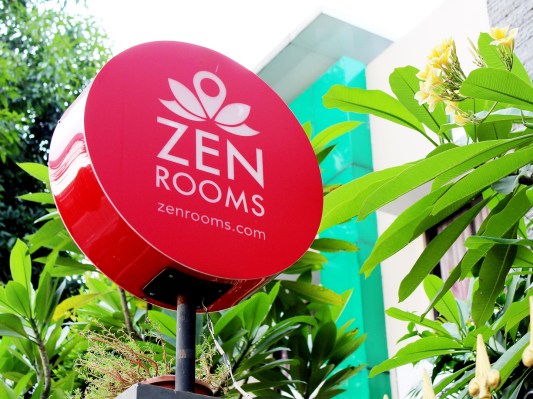Zen Rooms, a budget hotel network funded by Rocket Internet among others, is facing shutdown if investors are unable to sell the loss-making business.
The two-year-old company offers a network of affordable hotels in 50 cities across Southeast Asia that are designed as a happy medium between affordable guesthouses, which are typically not organized and hard to book online, and more expensive hotel chains. The startup has raised $8 million from investors to date, including a $4.1 million Series A last April that was led by Korea’s Redbadge Pacific and SBI Investment Korea with participation Asia Pacific Internet Group (APACIG), the joint venture fund in Asia between Rocket Internet and Qatari operator Ooredoo.
Now, however, the company is being aggressively shopped around to prospective investors and rival companies, three sources with knowledge of the plans told TechCrunch. Outreach over a potential sale has been ongoing for a couple of months, while an unspecified number of staff, including developers and senior team members, have been let go, TechCrunch understands.
One industry source who was aware of the efforts to sell the company described it as a ‘fire sale’ that is motivated by a quickly-disappearing runway. The company has just “months” of capital left in the bank, the source told TechCrunch.
Zen Rooms denied that it is being sold.
“We downsized in our Thai business which was our least profitable. We are re-investing in our other much more profitable countries. This was decided in Q4 and actioned late February. We will always keep on doing just that, so nothing special,” Zen Rooms co-founder and managing director Nathan Boublil told TechCrunch in a statement.
“Re: strategic conversations, they continuously happen and are of course confidential,” Boublil added.
The issues with Zen Rooms were first highlighted in a blog post from Momentum Works, a startup consultancy founded by ex-Rocket Internet employees.
It remains entirely possible that a new home will be found for Zen Rooms, which operates in a particularly competitive and challenging space. There are at least four venture-backed companies offering budget hotel networks in Southeast Asia which made competition particularly tough. Nida Rooms, one rival, hit a snag in 2016 when it ran out of capital and could no longer pay its staff. Today it has scaled back operations to just two countries where it operates a hotel booking platform.
A potential acquirer for Zen Rooms might well come from India. OYO Rooms, the company that pioneered the budget hotel concept, is present in Malaysia with plans to expand further in Southeast Asia thanks to a recent $250 million raise by SoftBank’s Vision Fund. Treebo Hotel, another well-funded Indian-based business, has voiced interest in moving into the region, too. RedDoorz, which operates in Singapore and Indonesia, is more a competitor and perhaps the only viable acquirer in Zen Rooms’ local market.
(Note: OYO Rooms has a controversial track record on M&A. It was linked with the acquisition of India-based rival ZO which never went through despite intense speculation.)
Outside of the startup world, hotel operators may be looking for a way to leverage the internet and new business models, but it remains unclear if Zen Rooms and its investors have been in contact with any players in the space about an acquisition.
Zen Rooms was one of a number of new ‘more independent’ businesses founded by Rocket Internet in Southeast Asia. Previously, with projects like Zalora and Lazada, Rocket maintained very tight control over the entities but in 2015 it adopted a new approach. Zen Rooms’ model, which has also been adopted by Vaniday and others, encouraging outside investors into the business with the aim of operating more like a startup than a traditional Rocket Internet project.
In this case, the model didn’t seem to have worked. It isn’t unclear why, but industry sources suggested to TechCrunch that a reliance on metrics and regional growth — two hallmarks of the Rocket Internet era — might have been prioritized at the expense of developing a more solid product-market fit and scaling in a more controlled manner.
For example, Zen Rooms quickly scaled to reach eight countries, considerably more than its local rivals which focused on going deeper in Indonesia, Southeast Asia’s largest economy and country based on population. Predominantly focused on Southeast Asia, Zen Rooms’ expansions included Sri Lanka, Hong Kong and Brazil, markets that share little in common.
Word of Zen Rooms’ situation comes less than a week after the closure of Lyke, an Indonesia-based fashion e-commerce also backed by APACIG. The startup raised nearly $4 million from APACIG and Rocket Internet ally Holtzbrinck Ventures in 2016 but wasn’t able to find a viable model.
